Blog
Tips for Conserving Water Outside Your Home
Last week, we wrote about the importance of having a proper drainage system on your property, but even though having water in the wrong places can be detrimental to your yard, water is also the life force that makes your landscape come alive. 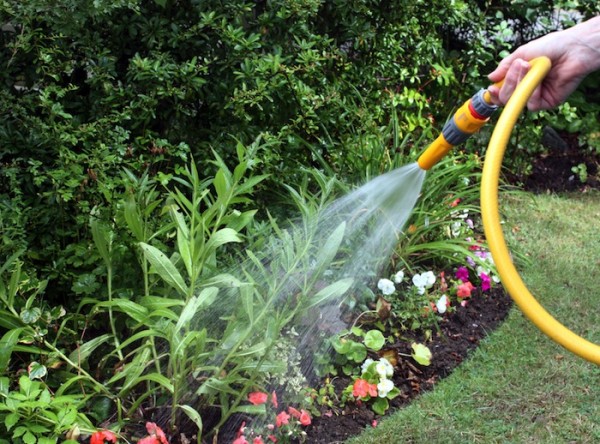 The arrival of spring planting season in New Jersey means there's much higher water demand, since people are trying to rejuvenate their lawns after a long winter.
The arrival of spring planting season in New Jersey means there's much higher water demand, since people are trying to rejuvenate their lawns after a long winter.
According to a recent article in the News Transcript, the demand for water has been increasing in Monmouth County over the past 100 years, even though the water supply in the state has remained the same. It's not hard to extrapolate the data and figure that the whole state's water usage has been steadily rising the past 100 years.
So in the interest of protecting the natural resources of New Jersey and encouraging green living, here are some tips for conserving water this spring.
Water lawn only when needed
With spring here, it's only natural to want to start fostering a lush and beautifully green lawn through consistent watering. However, it's not necessary to water your lawn every single day. According to the New Jersey Department of Environmental Protection, New Jersey lawns only need about an inch of water each week, with most of it already being received from rainwater. To test whether your lawn needs watering, step on the grass. If the grass pops back up, it doesn't need water.
Only water in the early morning
When your lawn does need watering, you should only do it in the early morning. If you water your lawn during the afternoon, the water will evaporate before it seeps into the soil, thereby forcing you to water even more.
Plant native species
We wrote about this at length in our post on making your landscape eco-friendly, but it's important to state again. Planting species native to New Jersey in your yard helps conserve water because they're used to the landscape and require less supplementary water.
Put a cover on your pool
If you have a pool, you should put a cover on top when you're not using it. This has multiple benefits. First, a cover will prevent water from evaporating during the middle of the day. Second, a cover can act as a pool heater, so you don't have to artificially heat the pool when you want to use it.
Keep your lawn between 2.5 to 3 inches tall
It's very tempting to keep your lawn really short and trim throughout spring and summer, but it's actually bad for your lawn and water conservation. If the grass is cut shorter than two inches, it becomes less drought resistant because there's less cover from the sun. It also becomes more susceptible to damage.
The Importance of a Proper Drainage System
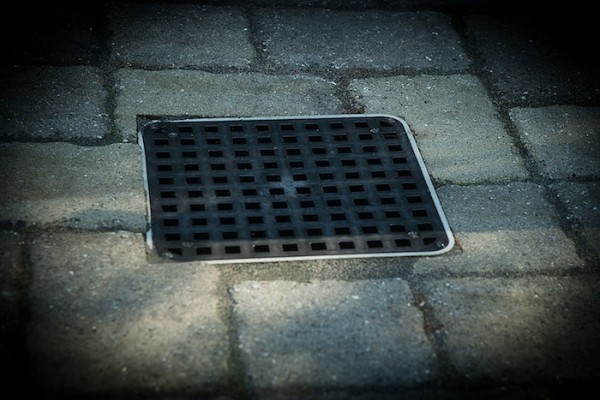
Fain fell across New Jersey last week, and there’s rain in the forecast in the future. Along with the awful flooding throughout the state, especially in places like Bergen and Hudson counties, the rain also brought a lot of fear into minds of residents.
New Jersey homeowners know, whether they’ve had property damage in Hurricane Sandy or been the victims of flooding, that water is the number one enemy of homes.
Water damage can cause major headaches, and the worst part about it is that you sometimes can’t see that you have a problem until it’s too late. That’s why it’s utterly important to have a proper drainage system that keeps water from building up.
If you’re not convinced of the need for a drainage system, here are some of the things water stuck on your property could cause.
Unstable foundation
Without proper drainage, water will run to the lowest part of your property, which is usually the foundation of your house. This could create cracks and even cause a house to collapse in time.
Termites
Believe it or not, improper drainage can encourage the presence of termites, which are attracted to the moisture that may accumulate in the foundation. This could cause major problems, including structural problems, if it’s not taken care of in a timely manner.
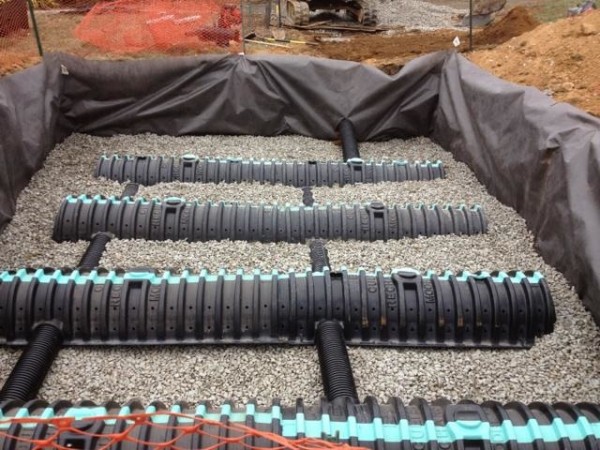 Mold
Mold
There are many major problems that can arise from having moisture in the basement due to poor drainage, including mold. Mold can grow after a flood or over time and stay unnoticed for long periods because people tend not to go in their basement frequently. Certain molds are very hazardous to your health.
Fungus
Some of the more minor issues related to improper drainage on your property can result in superficial problems as well. Lawn fungus becomes a nuisance because there’s not enough air flow and it creates the perfect condition for fungi.
If you suspect that you’re not sure whether you have drainage problems on your property, we wrote a post about how to tell if you have drainage problems by looking at key things in your house and yard.
Give us a call at 974-601-1114 to discuss your options and to find out how we can help you.
‘Jersey Grown’ Makes Push For Local Plants
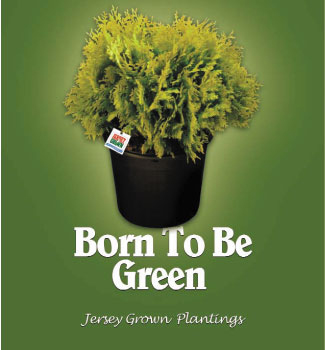
A few weeks ago, New Jersey Secretary of Agriculture Douglas H. Fisher kicked off the spring planting season with an urge for residents to visit local nurseries and garden centers.
Fisher and the Christie administration made it easier to find these local nurseries by launching the new site jerseygrown.nj.gov, which gives information on the Jersey Grown program and offers useful links. It also has information for gardeners, such as weather maps and a hardiness plant zone map.
Plants branded with the Jersey Grown program means they were grown in New Jersey. The reason you’d want to get plants that are locally grown is that they’re used to the New Jersey soil, have been checked for quality and are pest-free. Aside from the commercial benefits of the Jersey Grown program, promoting locally grown plants helps curb the spread of invasive species.
Here’s more from the Fisher via NJ.com:
“When planting your spring gardens this year, visit your nearby nursery or garden center and look for Jersey Grown annual bedding plants, perennials, shrubs and trees,” said Secretary Fisher. “These businesses at the shore and throughout the state are open and here to help during the Superstorm Sandy rebuilding process.”
Supporting local businesses and the state is obviously important, but the landscape of New Jersey is equally important. After Hurricane Sandy, much of the landscape was negatively affected, especially near the shores. To recover and prevent invasive species from growing into those spots, local plants are key.
So if you’re considering adding some greenery to your landscape this spring, remember to visit the Jersey Grown website to find local nurseries. Or give us a call and we can help you out.
You can also see a commercial for Jersey Green below.
Ways to Make Your Landscape Eco-Friendly
Today is Earth Day, a day to demonstrate support for the Earth and environment. And what better way to celebrate Earth Day than to offer some useful and actionable tips about making your landscape green… in the eco-friendly type of way.
Here are some things you can do to start lessening your environmental impact.
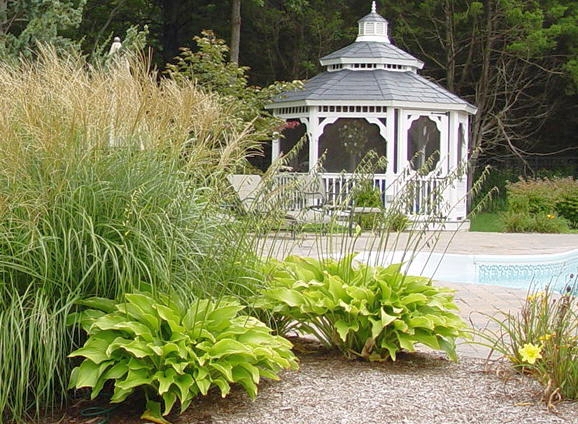
Recycle your grass
One simple thing you can do to reduce the amount of waste your landscape produces is to recycle everything. For example, don’t pick up the grass clippings after you’ve mowed because they provide nutrients to your lawn and can help prevent weeds from growing. (This is also a great way to reduce the amount of work you have to do when mowing the lawn.)
You can also use leaves, grass clippings and branches for mulch. Once your mulch has sat for a while, you’ll be able to nourish your garden. It’s a simple way to make your yard work for itself.
Water sparingly with recycled rainwater
Watering your lawn is essential for keeping it nice and healthy, but it’s important not to overwater your lawn. It may sound obvious, but you don’t need to water your lawn too much. Water during the early morning to decrease evaporation and only target the spots that need it the most.
The second aspect of this tip is to use recycled rainwater. Instead of tapping into the water supply, consider putting up a rainbarrel somewhere in your yard to catch rainwater. This will give you a small reservoir to water your lawn with.
Use native plants
Integrating natural plants in your landscape is a great way to reduce the amount of work and watering your yard requires because the plants will already be used to the New Jersey climate. Also, native plants are continually disappearing at the hand of invasive plant species, which is why you should make a concerted effort to preserve the natural landscape of your yard.
If you need other compelling reasons to plant native species, check out our previous blog post.
Avoid pesticides
Another thing people with beautiful landscapes tend to overuse is pesticides. Americans use millions of pounds of pesticides every year, despite the fact that pesticides have been linked to diseases, birth defects and environmental issues. You could realistically go without pesticides by using environmentally friendly fertilizers that keep bugs away.
If you want work done on your landscaping, give us a call at 973-601-1114.
Benefits of Installing a Backyard Water Feature
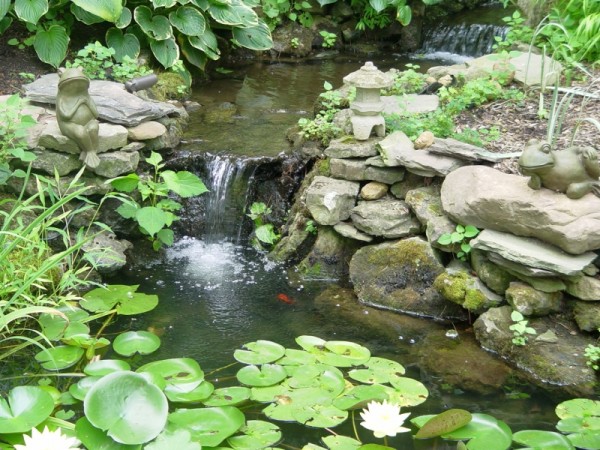
Whether you’re thinking about installing a waterfall or an outdoor pond, having some sort of water feature present in your backyard brings out the best in your property.
Even though you might be tempted to look more at the price tag and potential upkeep of anoutdoor water feature, there are tons of benefits of getting one installed in your yard. Here’s why you should do it.
1. Creates a peaceful ambiance
Forget all your worries. Release your inhibitions. Let the sound of running water wash over you. It might sound overly mystical, but water is actually a spiritual element that helps take those who meditate to another level. While you don’t necessarily have to go that far, simply closing your eyes and listening to the sound of a waterfall or the droplets of a pond is enough to create a peaceful getaway.
2. Increases the resale value of your home
Sure, being able to relax in backyard is a great way to think about an outdoor water feature, but let’s get down to the brass tacks: money. The cost of installation on these can vary with each project, but they usually end up paying for themselves and some because of how much the right feature could increase the value of your home.
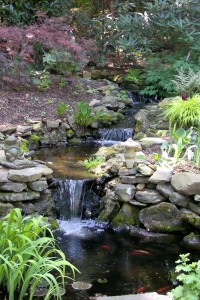 3. Attracts wildlife
3. Attracts wildlife
The worse backyards are those that are plain, empty and lifeless. Not only do water features add sound and movement, but they can also bring in beautiful bird species along with other wanted creatures. Instead of having to put up bird feeders somewhere in your yard, the birds will be naturally attracted by the sound and presence of water in which they can drink and frolic in.
4. Adds aesthetic appeal to your yard
If you feel like your backyard is bland, a water feature can spice it up and bring it to life. Think about hosting a late afternoon cocktail party in your backyard and seeing your guests in awe over the majesty of a pond with a waterfall. That’s something you can’t easily replicate with a simple update.
5. They’re flexible
The great thing about outdoor water features is that they’re flexible and can be designed to perfectly accentuate the positives of your yard. If you have a small yard, a fountain might be the best option, but if you have a large yard, a nice pond filled with fish could be a complement.
Contact us today to find out more about what types of water features we offer.


